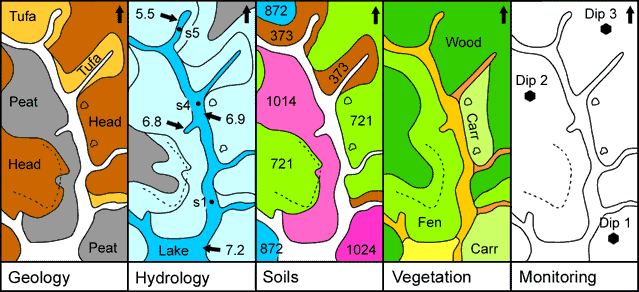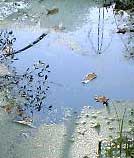Why do things often go wrong with water, wetlands and wildlife?
Usually because of incomplete knowledge. Only if it can be effectively demonstrated that sensitive wetland habitats (streams, ponds, bogs, marshes, fens, wet woodlands, wet heathlands and mires) will not be irretrievably damaged by development, abstraction or non-point source pollution, should development be permitted.
What is needed to ensure knowledge is complete?
It is important to understand the dynamics and chemistry of the system, and know what changes are likely to occur over the long term. This understanding involves many scientific disciplines including: hydrology, ecology, wetland ecology, landform, geology, pedology, hydrogeology, hydrochemistry, soil water regimes and monitoring.
How can you be sure you have the complete picture?
Whether you are working on a site, creating management plans or making planning decisions, ensure that the above disciplines have been taken into account. Leave any of these out and the picture will be incomplete.
How can we help?
Ron Allen, Managing Director of long established firm The Environmental Project Consulting Group, has brought the above disciplines together and named them "hydro-ecology" (a term which is rapidly being adopted within the industry). Our unrivalled reputation in this unique field is further demonstrated by our extensive hydro-ecology project list.
At the cutting edge of wetland design and management, the success of our projects is based on meticulous studies, sound science, a creative approach, extensive knowledge and highly skilled technical and practical experience. All projects are accompanied by stunning yet extremely user friendly reports, designs, drawings and plans. (A quote from the Environment Agency about one of our projects "....we would like to keep a copy of the soft landscape scheme on file to be used as an example of good practice. Other developers would do well to follow such an example!")
Anything else?
Yes - SUDS
Combining "hydro-ecology" with the talents of our experienced landscape engineers means that we design Sustainable Drainage Systems to suit most sites.
Training Courses
We run regular training courses in "hydro-ecology" for governmental and non-governmental organisations eg. English Nature, Wildlife Trusts, Otters and Rivers Project, Forestry Commission.
The Environmental Project Consulting Group is highly respected and can: - Help you understand more about how your wetlands work;
- Help you create management plans that are based on real site conditions;
- Check that proposed schemes are truly sustainable;
- Help you solve complex development problems in a fully sustainable way.
*The map below demonstrates our unique approach to wetland understanding and problem solving

FACT: A key test of a sustainable development is the extent to which biodiversity remains uncompromised by development.
WHICH MEANS THAT: An environmentally sustainable development should not adversely affect the wildlife habitats with which it is directly or indirectly associated and wherever possible should enhance those habitats.
WATER AND WETLANDS are under threat from development, abstraction and non-point source pollution and they are priority habitats in Biodiversity Action Plans.
|




